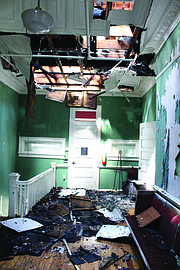The South Arkansas Community College Board of Trustees held a special meeting yesterday to discuss the fire damage sustained by the Administration Building in a fire that broke out a week and a half ago during severe storms in Union County.
Brian Beardan, of VeriClaim, Inc., confirmed that it was a lightning strike that caused the fire. The Board was shown photos of a 16-second long lightning strike that occurred at 10:22 p.m. April 13. The storm tripped the alarm in the nearby Computer Technology Building, drawing police to the scene. Officers noticed smoke coming from the Administration building and called the fire in at 10:44 p.m.
Fire Chief Chad Mosby described some of the issues firefighters faced in trying to contain the fire. He said the tall ceilings posed a problem because, typically, a three-story building would not be as tall as the Administration building. High ceilings are common in older buildings – the high ceilings helped control the temperature in rooms before air conditioners and heaters became commonplace.
Mosby also said the attic’s passageways were very narrow, which made navigation difficult. The ceilings in the attic are 12 feet tall, the same as a typical commercial building’s ceilings. The attic had also been retrofitted with cellulose insulation. Mosby said that while that type of insulation is usually treated with fire retardant, when it does catch, it is comparable to a sawdust fire.
“A pile of sawdust catches here, you put it out on the surface and it’ll smolder and burrow until it pops up over here and catches there, and then you put it out and it’ll smolder. And so the only way to put a sawdust [fire] out is to spread it out,” Mosby said.
Photos shown at the meeting showed piles of the insulation in third-floor offices where the ceilings had fallen through.
Throughout fighting the fire, the night’s storms raged on. Twice, firefighters had to take shelter in their trucks because of tornado warnings. When that happened, they also had to take their equipment down, as the ladders could have acted as lightning rods, worsening the problem.
“The tornado warning drove them out of the building. We had to pull the ladder trucks down, because they’re essentially huge lightning rods at this point. … As soon as they got the all-clear, they immediately went back to the building, started knocking it back, and about the time they were making some headway, the second tornado warning hit,” Mosby said.
He said that over five hours, the firefighters were spraying 6,000 gallons of water into the building a minute, and that between fighting the fire and a water main break across town, the water utilities reported that daily usage that day was over 4 million times higher than usual.
Eventually, the roof caved in, which made the job easier. Firefighters outside the building were able to get more water into the attic. They were also able to see better with the natural light. Before the roof caved in, they were having trouble navigating the narrow corridors because the water from the sprinkler was overpowering.
Mosby said that at 5:30 a.m. Saturday, he called a second shift of firefighters in early in order to give those that worked through the night a break. Lawson Volunteer Fire Department also helped to put out the blaze.
After Mosby’s report, Beardon explained the insurance process SouthArk is going through. The college is covered by multiple insurance agencies, including the state of Arkansas. For a claim as large as SouthArk’s, however, the money from the state can not come into play. In this case, American International Group (AIG) holds the policy, and VeriClaim was contracted by AIG to assess the building’s damage. The building is insured for $6.4 million and its contents for $1.7 million.
Bearden said their goal was to bring the building back to a "pre-loss condition." While some of the materials will be difficult to reproduce, he said they were going to do everything they can to restore the building to the way it was before the fire.
He said the first step will be putting a new roof on the building, something they hope to have done within 45 days, though that timeline could change. He said the walls are not totaled, so structural damage is minimal and should not affect use of the building in the future. The inside of the building will be gutted, but once the new roof has been installed, repairs and restoration should begin.
Metro Disaster Specialists is a large loss restoration service that contracts with the state. Their loss specialist, Robert Williams, gave an overview of their work. First, they will make sure that the building is safe to use and move around in. Currently, they are taking inventory of everything found inside the building. They are also removing carpet and debris from inside. Within the week the building will have a scaffold around it, which Williams said was a safety measure.
SouthArk President Barbara Jones said it would be at least a year until the building’s restoration is complete, though no one was able to give a concrete time-table. Officials are working to find more long-term temporary offices for SouthArk and Metro Disaster employees. They have used two student lounges since the fire, in addition to other rooms. “We’re going to be back and we’re going to be stronger,” Jones said.
Caitlan Butler can be reached at 870-862-6611 or [email protected]

